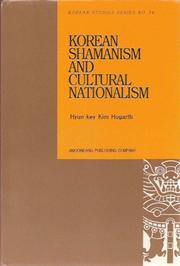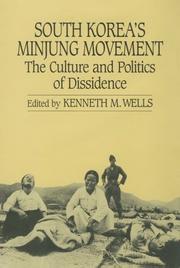| Listing 1 - 6 of 6 |
Sort by
|

ISBN: 8988095146 9788988095140 Year: 1999 Volume: 14 Publisher: Seoul Jimoondang
Abstract | Keywords | Export | Availability | Bookmark
 Loading...
Loading...Choose an application
- Reference Manager
- EndNote
- RefWorks (Direct export to RefWorks)
Shamanism --- Korea --- Civilization --- Shamanistic influences --- K9060 --- K9310.20 --- Korea: Religion -- shamanism -- general and history --- Korea: Society, social psychology and social-anthropological phenomena (South) Korea -- nationalism --- Shamanistic influences. --- Shamanism - Korea --- Korea - Civilization - Shamanistic influences
Book
ISBN: 9789004185036 Year: 2010 Publisher: Leiden Brill
Abstract | Keywords | Export | Availability | Bookmark
 Loading...
Loading...Choose an application
- Reference Manager
- EndNote
- RefWorks (Direct export to RefWorks)
Social Darwinism --- Nationalism --- Darwinisme social --- Nationalisme --- Korea --- Corée --- Social policy --- History --- Politique sociale --- Histoire --- K9300.60 --- K9309 --- K9310.20 --- Korea: Social sciences -- social and cultural history -- modern period (1860s-[1945]), 20th century general --- Korea: Social sciences, society -- social theory, movements and protests --- Korea: Society, social psychology and social-anthropological phenomena (South) Korea -- nationalism --- Corée --- Darwinism, Social --- Competition --- Social change --- Social conflict --- Social evolution --- Social policy.

ISBN: 0824817001 Year: 1995 Volume: *1 Publisher: Honolulu University of Hawaii Press
Abstract | Keywords | Export | Availability | Bookmark
 Loading...
Loading...Choose an application
- Reference Manager
- EndNote
- RefWorks (Direct export to RefWorks)
Populism --- -Nationalism --- -K9300.80 --- K9310.20 --- K9309 --- Consciousness, National --- Identity, National --- National consciousness --- National identity --- International relations --- Patriotism --- Political science --- Autonomy and independence movements --- Internationalism --- Political messianism --- History --- -History --- -Korea: Social sciences -- social and cultural history -- modern period, postwar period (1945- ) --- Korea: Society, social psychology and social-anthropological phenomena (South) Korea -- nationalism --- Korea: Social sciences, society -- social theory, movements and protests --- Korea (South) --- -Populism --- K9300.80 --- Korea: Social sciences -- social and cultural history -- modern period, postwar period (1945- ) --- Nationalism --- Korea [South ] --- 20th century --- 1960-1988 --- Populism - Korea (South) - History - 20th century. --- Nationalism - Korea (South) - History - 20th century. --- Korea (South) - History - 1960-1988.
Book
ISBN: 4901558064 Year: 2002 Publisher: 京都 国際日本文化研究センター
Abstract | Keywords | Export | Availability | Bookmark
 Loading...
Loading...Choose an application
- Reference Manager
- EndNote
- RefWorks (Direct export to RefWorks)
Nationalism --- Tonghak Incident, 1894. --- Religious aspects. --- History. --- Korea --- Religion. --- Tonghak Incident, 1894 --- K9050.60 --- K9053.70 --- K9081 --- K9097.40 --- K9300.60 --- K9070.60 --- K9310.20 --- K9161 --- Nationalism and religion --- Religious aspects --- History --- Korea: Religion -- history -- modern period (1860s-[1945]), 20th century general --- Korea: Religion -- relations and contrasts -- society --- Korea: Religion -- new religions -- Ch'ŏndogyo, Donghak --- Korea: Religion -- Christianity -- schools, sects and denominations -- protestant church --- Korea: Social sciences -- social and cultural history -- modern period (1860s-[1945]), 20th century general --- Korea: Religion -- Buddhism -- history -- modern period (1860s-[1945]), 20th century general --- Korea: Society, social psychology and social-anthropological phenomena (South) Korea -- nationalism --- Korea: History -- Western intervention and opening of Korea (1860s-1910)
Book
ISBN: 9780231157483 9780231157490 0231157495 0231157487 9780231500715 0231500718 1281919713 9786613792686 9781281919717 6613792683 Year: 2012 Publisher: New York Columbia University Press
Abstract | Keywords | Export | Availability | Bookmark
 Loading...
Loading...Choose an application
- Reference Manager
- EndNote
- RefWorks (Direct export to RefWorks)
Korean writers and filmmakers crossed literary and visual cultures in multilayered ways under Japanese colonial rule (1910-1945). Taking advantage of new modes and media that emerged in the early twentieth century, these artists sought subtle strategies for representing the realities of colonialism and global modernity. Theodore Hughes begins by unpacking the relations among literature, film, and art in Korea's colonial period, paying particular attention to the emerging proletarian movement, literary modernism, nativism, and wartime mobilization. He then demonstrates how these developments informed the efforts of post-1945 writers and filmmakers as they confronted the aftershocks of colonialism and the formation of separate regimes in North and South Korea. Hughes puts neglected Korean literary texts, art, and film into conversation with studies on Japanese imperialism and Korea's colonial history. At the same time, he locates post-1945 South Korean cultural production within the transnational circulation of texts, ideas, and images that took place in the first three decades of the Cold War. The incorporation of the Korean Peninsula into the global Cold War order, Hughes argues, must be understood through the politics of the visual. In Literature and Film in Cold War South Korea, he identifies ways of seeing that are central to the organization of a postcolonial culture of division, authoritarianism, and modernization.
Korean literature --- Motion pictures --- Nationalism and literature --- Politics in literature --- Politics in motion pictures --- K9310.20 --- K9700.80 --- K9790 --- Political science in literature --- Literature and nationalism --- Literature --- Cinema --- Feature films --- Films --- Movies --- Moving-pictures --- Audio-visual materials --- Mass media --- Performing arts --- History and criticism --- Political aspects --- Korea: Society, social psychology and social-anthropological phenomena (South) Korea -- nationalism --- Korea: Literature -- history -- modern period, postwar period (1945- ) --- Korea: Performing and media arts -- cinema --- Politics in literature. --- Politics in motion pictures. --- Littérature coréenne --- Nationalisme et littérature --- Cinéma --- Politique au cinéma. --- Korean literature. --- Motion pictures. --- Nationalism and literature. --- History and criticism. --- History --- Histoire et critique. --- Histoire --- Political aspects. --- 1900-1999 --- Korea (South)
Book
ISBN: 9780231172288 9780231540988 0231540981 0231172281 Year: 2016 Publisher: New York
Abstract | Keywords | Export | Availability | Bookmark
 Loading...
Loading...Choose an application
- Reference Manager
- EndNote
- RefWorks (Direct export to RefWorks)
"JaHyun Kim Haboush argues that beginning with the outbreak of the Imjin War, when Japan invaded Korea in 1592, a discourse of nation emerged in Chosôn Korea (1392-1910) which continued, in a variety of forms, until the modern era. This is the first book to examine the formation of the Korean nation before the modern era. The Imjin War and the rise of the Manchu were events of monumental importance in East Asian history. The Great East Asian War escalated into a six-year regional war in which the three East Asian countries, Japan, Korea and China, fought either as allies or enemies, with a commitment of large forces, fighting on sea and land. This conflict was by far the largest war known to the world in the sixteenth century. In East Asian memory, it remained unequalled in scale until the Second World War. In Korea the Chosôn dynasty began in 1392 and persisted until 1910, and within this dynasty an idea of nation emerged and circulated. This discourse of nation shifted and intensified after the Manchu invasion in 1636. Haboush shows how this process was a visible, traceable, and documented phenomenon. The idea of a sixteenth century Korean nation is also unfamiliar in Korea. Nationalism for the most part is presented as a preexisting condition in the Imjin War, though 'strengthened' and 'heightened' by the experience. Scholars of the modernist camp subscribe to the historicism of Western historiography. They present the nationhood of Korea as a narrative of transformation, locating its arrival in the modern period, sometime in late 19th or early 20th century, under the auspices of new ideologies and visions from the West"--Provided by publisher.
Nationalism --- War and society --- Society and war --- War --- Sociology --- Civilians in war --- Sociology, Military --- Consciousness, National --- Identity, National --- National consciousness --- National identity --- International relations --- Patriotism --- Political science --- Autonomy and independence movements --- Internationalism --- Political messianism --- History --- Social aspects --- Japanese Invasions of Korea (1592-1598) --- Manchu Invasions of Korea (1627-1637) --- Korea --- East Asia --- Asia, East --- Asia, Eastern --- East (Far East) --- Eastern Asia --- Far East --- Orient --- Influence. --- History, Military --- K9154 --- K9155 --- K9300.50 --- K9310.20 --- Korea: History -- Chosŏn period -- Japanese invasion, Imjin war (1592-1598) --- Korea: History -- late Chosŏn period, isolation, Qing dependency (1600-1895), Manchu invasions (1627, 1637) --- Korea: Social sciences -- social and cultural history -- Chosŏn period (1392-1910) --- Korea: Society, social psychology and social-anthropological phenomena (South) Korea -- nationalism
| Listing 1 - 6 of 6 |
Sort by
|

 Search
Search Feedback
Feedback About
About Help
Help News
News